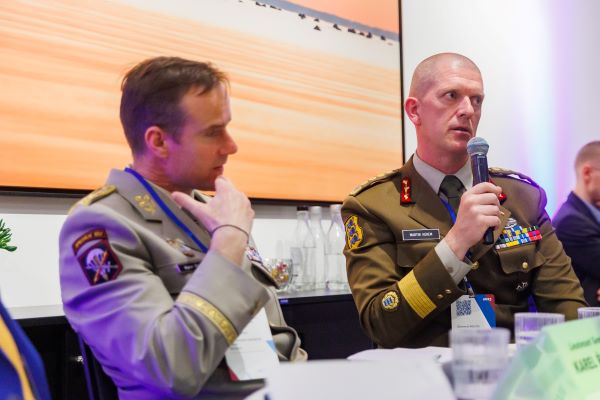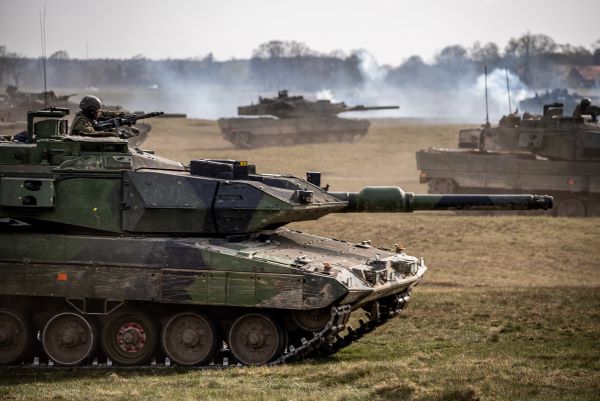On NATO’s eastern flank ‘the threat is tangible’, the Militaire Spectator reported after last year’s Lennart Meri Conference in Tallinn, Estonia. A year on, despite Russia’s military setbacks and failure to reach its objectives in Ukraine, that is still the case. General Martin Herem, Commander of the Estonian Defence Forces, stated during the 2023 edition of the conference: ‘Maybe Russia cannot be deterred.’[1] However, he added, ‘the war in Ukraine teaches us that Russia can be beaten in our own home.’ Despite suffering significant casualties — many more than during the Soviet Union’s failed invasion in Afghanistan — the Russian military fights on with dogged determination. Therefore, to defend against a Russian invasion of Estonia or any other NATO Ally ‘we should be prepared to kill each and every invader’, General Herem said rather grimly.
The opening panel of the 2023 Lennart Meri Conference (entitled ‘Incipit Vita Nova – So begins New Life’, hereafter LMC) featured the Prime Ministers of the three Baltic states, EU Commissioner Margrethe Vestager, and renowned historian Timothy Garton Ash. ‘We should have listened to Estonia earlier. Unfortunately, there’s nothing like real personal experience’, Garton Ash said about the Baltic states’ and Poland’s warnings concerning Russia’s malign intentions. Estonian Prime Minister Kaja Kallas added that ‘For Western Europe the peace after the end of the Second World War meant liberty and prosperity. The countries on the wrong side of the Iron Curtain also had peace, but we were not free and we suffered from severe oppression. Western European nations cannot understand what this was like.’

General Martin Herem (r), Commander of the Estonian Defence Forces. Photo ICDS, Arno Mikkor
During a side event of the LMC, an Estonian official stressed the unity in his country with regard to the war in Ukraine. Even though the Riigikogu, the Estonian Parliament, is strongly divided about many domestic issues, a rather hawkish text on NATO-Ukraine relations received overwhelming support: 95 of the 101 Riigikogu members spoke out in favour. This can be explained by Estonia’s history and experience with Russia. ‘We know Russia very well’, the official said. ‘Nothing about Russia has surprised us for years, Moscow’s path has been extremely predictable. This war is an existential issue for Estonia because the outcome will determine new norms for European security.’ Prime Minister Kallas emphasised this existential threat from a different angle: ‘For a small country like ours, war means destruction and suffering. For empires (like President Vladimir Putin’s regime still perceives Russia to be, ed.) it means glory.’
‘Listen to the Baltics’
Kallas, labelled by some as Europe’s ‘new Iron Lady’, is on a mission to support Ukraine as much as possible. She has, for example, initiated the EU plan for joint procurement of ammunition. Kallas also called for a legal framework to try Russia in court: ‘When aggression pays off even a little bit, it is an invitation for more aggression.’ Therefore, ‘Russia must be held accountable. There can be no impunity, no immunity.’ The International Criminal Court can prosecute the Russian military for war crimes they committed but, Kallas said, ‘Before the military perpetrated those war crimes, the Russian leadership first committed a crime of aggression. We need a special tribunal to address that.’
While Prime Minister Kallas refrained from saying out loud to Western Europe ‘we told you so’, some other speakers at the LMC did so vocally and continued to issue warnings. ‘The West invested in its own potential enemies, and with regard to China it might be making the same mistake again’, said one speaker, implying, ‘Listen to the Baltics, follow their example’. Poland has ambitious plans to set such an example. Warsaw wants to acquire no less than 1,600 modern tanks, as was outlined in one of the LMC discussion panels, and it aims to have the most powerful land force in Europe. With capabilities like that, in the event of a Russian attack against Poland, the Polish military could bring the fight to ‘the Russians’ own area, which is the only way they can be stopped’, one speaker said, echoing General Herem’s comments.
Total defeat?
Over the course of the conference and side events, several speakers alluded to the need for internal change in Russia. Unlike Germany after 1945, Russia, after the collapse of the Soviet Union was never forced to account for the crimes of its former dictatorial regime. Looking forward into the future, Latvian Prime Minister Krišjānis Kariņš proclaimed that ‘To have true peace in Europe, profound defeat of Russia is needed. But we also need Russia to change so we wouldn’t be coming back to this place again.’ Some way or other the West will eventually have to deal with Russia again. It may take several generations, however, to establish a relationship built on trust, and only if Russian society goes through a process of fundamental change. Regaining trust is not impossible, as evidenced by NATO’s eastern members’ call for German leadership and strength in the current crisis, something that had long been unthinkable in the post-WWII era.

NATO exercise in Sweden, with, among others, participation from Estonian forces. General Herem: 'We need to prepare for war, with supplies and mentality'. Photo NATO
Germany indeed experienced total defeat in 1945, making it possible for the victors to hold it to account for its heinous actions before and during the war. Such circumstances do not apply to Russia today, so real change has to come from the Russian people itself. In fact it is ‘Russia’s tragedy’, said historian Timothy Garton Ash, ‘that it cannot suffer a defeat like Germany did. That defeat is the foundation upon which Germany’s freedom, democracy and prosperity are built.’ In the spirit of the LMC’s theme (‘So Begins New Life’), Garton Ash added that the war in Ukraine ‘provides opportunities for a better Europe.’ But in order to achieve this, ‘we must put the illusion of a post-war Europe behind us and support Ukraine until it wins a clear, decisive military victory.’ He continued: ‘To seize this chance we have to prepare actively for the second great, double eastward enlargement of the geopolitical West: EU and NATO, both. The Western Balkans, Ukraine, Moldova, Georgia, all of them should be on the path to membership in both organisations. To expand the frontiers of a Europe “whole and free” is a strategic goal.’
Until then, in case Russia may not be deterred from further aggression, Western Europe should listen to the Baltics. To conclude with Estonia’s Defence Chief General Herem: ‘We need to prepare, and really prepare for war. With supplies and mentality.’
[1] The Lennart Meri Conference was held on 12-14 May in Tallinn, Estonia. Most of the sessions were subject to Chatham House Rules, so many speakers’ names and affiliations will not be mentioned in this article. See: https://lmc.icds.ee/.